Jesse Straight of Whiffletree Farm in Warrenton, Virginia is one of several area farmers who drive into DC and its suburbs to deliver goods direct to consumers at central locations. For those who like to buy local, to meet their farmers, and the use of sustainable farming methods, the farm drop route is becoming a popular alternative to supermarket shopping.
Straight is the father of five children aged one and a half to almost 8. Having been a happy customer of Whiffletree’s for several months, I asked Jesse to share with Mindful Healthy Life readers a little bit more about his farming practices, his business, and how both influence his parenting.
Mindful Healthy Life: Tell us about how you got started farming in general and in particular how you decided to start Whiffletree Farm.
Jesse: I was born and raised in Fauquier County, but not to a farming family or on one of its beautiful farms – just next to one, where my friends and I would ride our bikes, climb trees, sled, hunt squirrel, fish, build forts, and generally tromp. I was a normal suburban kid who did not know anything about farming but who loved being and working in Fauquier’s outdoors! When I graduated from Fauquier High School in 2000, I was thinking about a variety of vocations, but farming was not on that list.
So I graduated from UVA studying religion and the pre-med sciences, married Liz, got a job with Charlottesville’s Habitat for Humanity, and read a book by Wendell Berry.
To make a long story short, the Wendell Berry novel got me going in the farming direction, and I kept pursuing it: reading more, visiting farmers, making forays into my own farming enterprises. All of this led me to Joel Salatin of Polyface Farm in Staunton, Virginia. Joel is an inspiring farmer and businessman. I wanted to take the leap and intern at Polyface, but alas, I could not with a wife and baby; there was no family intern housing. So I had to make my fumbling way with books, by trial and error, and some day trips to Polyface.
In April 2009 we moved back to Warrenton to be in my beloved hometown, near my family and old friends, and to start our farm business! We were happy to return to Warrenton but did not know all the ways in which we would be so well befriended and cared for here. Our family, our old and new friends, our customers, our farming friends, our church – we could not have anticipated how much generous kindness we have received.
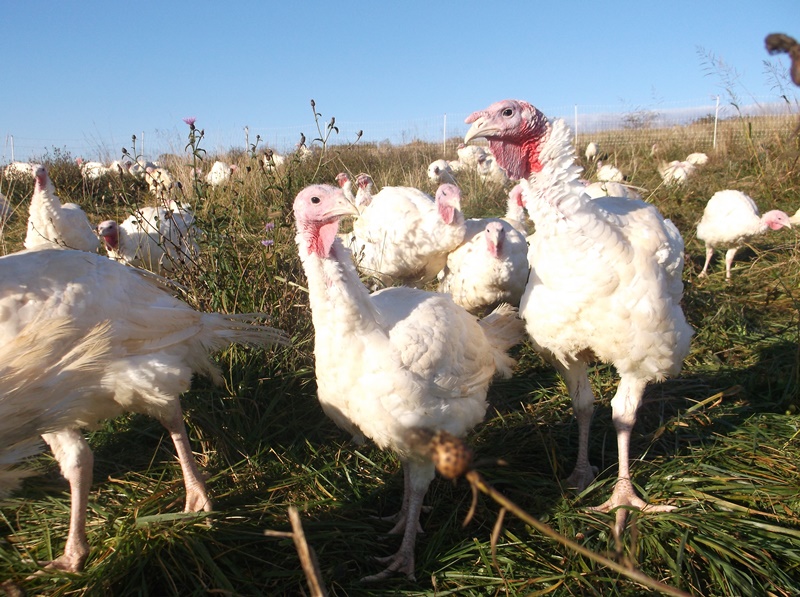
Q: What are some of your core farming principles?
A: Our two most fundamental farming principles are
(1) we try to humbly let nature be our guide and
(2) we try to benefit all parties involved.
For us, (1) means we don’t foolishly beat our head against the way nature likes to work. We pay attention to how plants and animals thrive naturally. And (2) means we approximate those natural patterns for our domesticated and wildlife animals and plants with the goal of benefiting the health of the land, animals, eaters, farmers, and community!
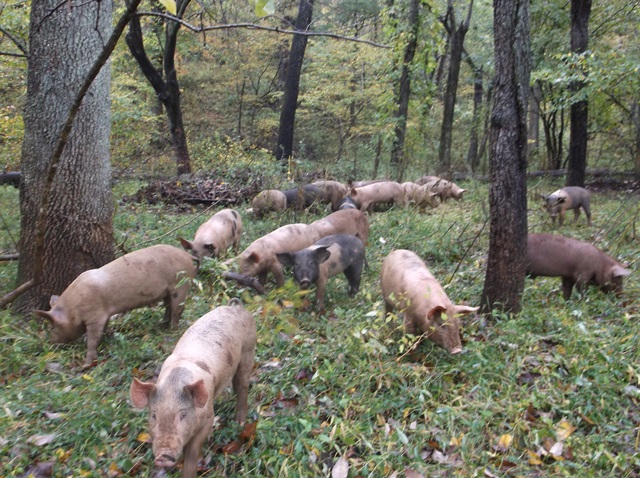
That’s the theoretical. The nitty gritty of that applied is:
1. Constantly move animals to fresh pasture and forage.
Animals in nature are always on the move. They know that it is in their best interest to get fresh, nutritious, clean forage over there, not right here where they just ate, trampled, and defecated. Also, this makes life hard on any pathogen. Pathogens have to chase their host—not like in a CAFO where where host and environment make for a pathogen paradise!
2. Clean water, feed, and ground. Duh! But seriously, clean water, feed, and ground prevent an animal’s immune system to be inordinately stressed (and therefore to not need antibiotics, etc.!)
3. Don’t waste anything. By definition, “wasting” and “sustainable” do not go together. For example, whatever we don’t eat or sell of our poultry (blood, feathers, and guts), gets composted into nutritious soil that goes back onto our pastures to make for even healthier forage to make healthier animals to make healthier people, etc., etc.!
4. Non-GMO feed. I am all for human innovation—just in a way that fits the patterns of nature. GMO feed has genetic combinations that could never happen through natural plant breeding. However well-intended this technology might be, I think it is an unwise and short-sighted rejection of nature’s patterns. It will have the negative long-term consequences that are inherent with the rejection of the patterns of nature. One of those immediate negative consequences is that the whole impetus of GMO crops is to be able to spray herbicide without damaging the crop—which effectively means more herbicide laden crops and more super-weeds that survive and thrive in the monocultured, herbicided crop.
5. No Antibiotics. The goal of our farming practices to promote the natural thriving of our animals. This means we don’t need band-aid fixes like antibiotics. This also means we are not killing all the beneficial gut bacteria of our animals. And I think the following is commonsense wisdom: “healthy animals means healthy food.”
Also, this means we are protecting the efficacy of antibiotics for when they are really needed: in crisis situations for humans. Every time an antibiotic is used, that is an occasion for antibiotic-resistant bacteria to survive and thrive. Animals in a sickening environment on regular antibiotic dosages is a perfect breeding ground for superbugs that could make our antibiotics ineffective for animal or human usage.
6. No chemicals on the land. Livestock, poultry, wildlife, pasture, sun, rain, the soil and its microbes are all in a dance, and if choreographed within nature’s patterns, will produce fertility and health!
7. No chemical wormers. If it is toxic enough to kill intestinal worms, its toxicity isn’t stopping at the worms. Again, better to manage the animals in such a way as to make life hard on an intestinal worms from finding an easy home. In addition we will use “mechanical wormers” like organic soap in our cattle’s water to wash out worms.
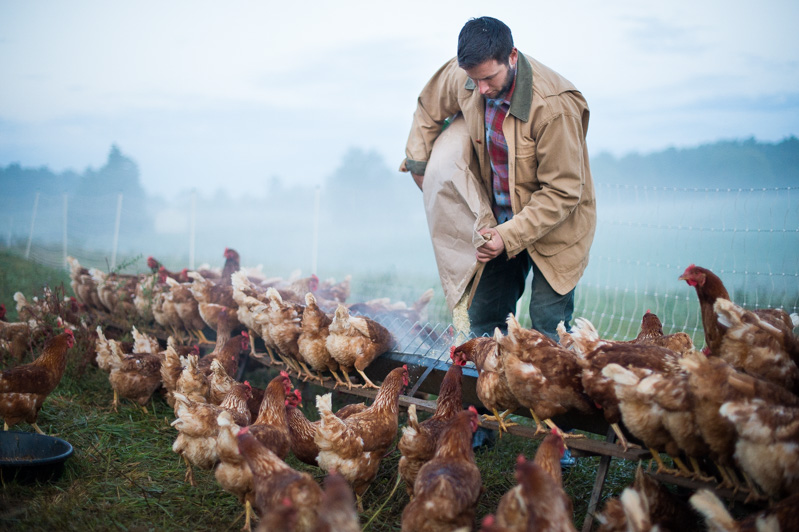
Q: What else can you share with us about how your livestock are raised and fed?
A: Whoops! I think I accidentally answered a lot of this question in the above, but just to lay it out succinctly: All our animals are on fresh pasture (except winter, when it is not good for them or the dormant pasture). Non-GMO feed, no antibiotics, no chemicals, and our beef is Wagyu and 100% grassfed!
Q: Delivery details: Currently, you deliver to a certain number of locations and arrive at a certain time. That list is available here: https://www.whiffletreefarmva.com/delivery-order-form. Tell us about the new drop in Alexandria that is on the first Wednesday of the month and what other changes customers are seeing this winter.
A: The idea behind our monthly delivery drop points is to make it easier for customers to connect directly with us, their farmer and their farm. Of course, it would be wonderful if everyone could drive to the farm on a regular basis, see the happy animals, lush pasture, and us Whiffletree farmers in action. A number of people do, and we love that, but for a lot of people that is not possible. So we come to you! And we hope that our delivery customers will come and enjoy the beauty of our farm and see our farming practices in action at least a couple times a year for our events.
Last spring we held our first “Spring Squawker”—live music, our food BBQ’ed, local microbrew, farm tour, our farming friends offering demonstrations and samples, and kids romping in the grass while parents enjoyed the scene and each other!
Our new drop in Alexandria is hosted by my dear sister-in-law and brother-in-law, Cara and Denis Whelan. They just moved back from Australia and we are very happy to have them this close. They have been faithful supporters of our work (before they were married, they came out and slaughtered and processed turkeys with us – what a date?!) and generously offered to be our Alexandria host.
The Arlington, Alexandria and DC drops are now the first Wednesday of the month, so February 3 and March 2 are the next delivery dates for those locations. Order by 5 p.m. the day before delivery.
Here is how it works: You order online at http://store.whiffletreefarmva.com/ by 5 p.m. the day before delivery. I will drop coolers on the host’s front porch on the delivery day—the first Wednesday of the month for DC, Arlington, and Alexandria. You will come between 5-8pm and grab your meat, eggs, veggies, etc. from the coolers. It will all be marked very clearly. Leave the coolers there, and put your check in the designated spot.
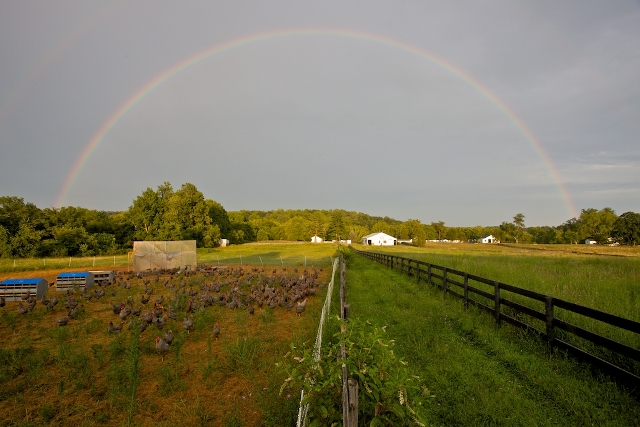
Click here for a full schedule of deliveries to all locations, including several other sites in Northern Virginia.
Q: Tell us about the Meat Box option. What are the advantages to you and to the customer in getting the box rather than ordering a la carte?
A: The Meat Box is the CSA concept applied to meat. You pay in advance for a 4 month session, for a particular value of meat, eggs, and other add-ons that you pick up from the delivery spot once/month. For example: a $20, $40, $60, etc. “box” of meat at your delivery drop. The benefit to you is savings and convenience. The cost of the Meat Box is discounted 5% from what you would pay a la carte. Additionally, you don’t have to bother ordering each month and you don’t have to bother with paying each month; that is all taken care of already. My hope is that this will facilitate more people doing what they actually want to do: eat and support healthy food and farming. Many times I hear people say how they have been trying to place an order, but life keeps getting in the way. With this upfront commitment, they can actualize that commitment and hopefully have more of what they really want in their life. The final benefit is that a customer gets to have a tasting tour through our offerings. We never put what people might think of as “weird” cuts in the Meat Box (tongues, organs, etc.), but besides the “weird” cuts, a customer has a tasting tour from “nose to tail” of our chicken, turkey, pork, and beef!
The reason we are willing to take the 5% hit is because we like to have that committed sale, the upfront cash-flow is nice, and among all the popular cuts, we can even out our inventory. For example, if at that particular time we happen to have too many pork chops, they can go in to the Meat Box that week.
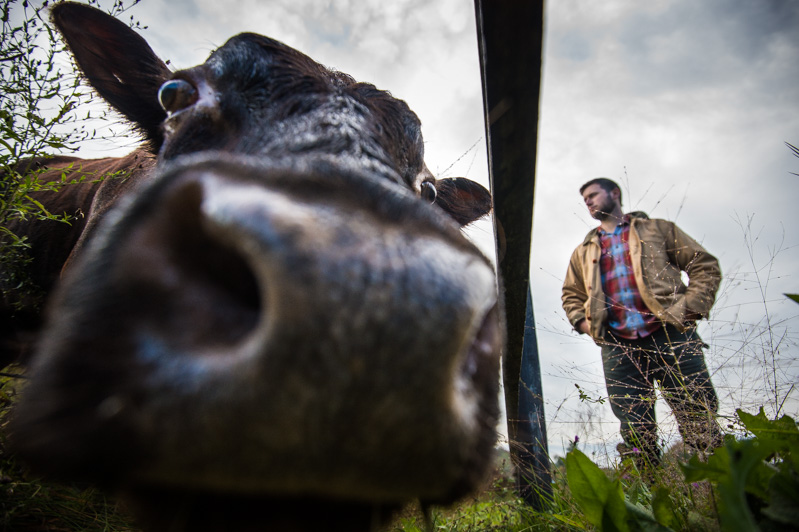
Q: You also offer your delivery customers items grown by nearby farms. Tell us a little bit about each one and how you got to work with them.
A: Yes, we offer many other things from our farming friends—organic veggies, raw honey, Laconiko olive oil, wild Alaskan salmon, grassfed lamb, fermented cod liver oil, soaked/sourdough/organic baked goods, kombucha, local/organic fruit, fermented sauerkrauts, soaps and balms made from our animal’s fat, local/organic teas/firecider/elderberry syrup.
This got started very accidentally. In regards to what we raise, our family was covered on the chicken, eggs, turkey, pork, and beef. But, of course, we eat other things too and so we sought those out for our family. In so doing, we realized that our customers had to do the same thing, and wouldn’t it make it easier on us – the Farm Store brimming with almost everything we need reducing our need to go to the grocery store or pick up from other co-ops off the farm! – and on our customers if we supplied those other things too?! And wouldn’t it be good for our farming friends to have those additional sales?!
The Weston A. Price Foundation has been a major influence on our food, health, and food preparation philosophy. So that strain of thought can be seen in what we have sourced.
1. Raw milk from our friends, the Micks at Golden Valley Guernseys.
2. Local, organic kombucha from MTO Kombucha.
3. Soaked, sourdough, organic baked goods from our friend, Sue Kosten of Suzie Sunday Treats
4. Local, organic veggies from our friends Melody Powers of Powers Farm, Susan Hewitt of Small Hitch Farm, and Eric and Rachel of Waterpenny Farm
5. True extra virgin olive oil from Laconiko.
6. Fermented sauerkrauts from Rachel at The Sweet Farm.
7. Local, grassfed lamb from a couple local farmer friends.
8. Local, organic apples and Asian pears from our friends Stacie and Casey at The Farm at Sunnyside.
9. Wild Alaskan Sockeye salmon from a fisherman acquaintance who moved from Fairfax to Bristol Bay, Alaska.
10. Soaps and balms made from our animal fats by our friend April Barker of Three Little Pigs Soaps.
11. Organic teas, raw honey, elderberry syrup, firecider from our friend Katherine Adams of Stallard Road Farm.
12. Fermented cod liver oil from Green Pasture.
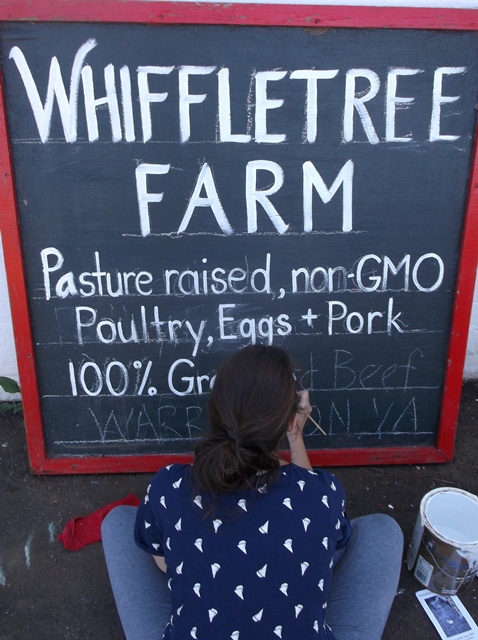
Q: How are your children involved in the business? What is the division of labor like with you and your wife? How can you make it work to do such a labor-intensive job with four little ones? Do you feel like your parenting is in alignment with your business, or do they sometimes feel at odds? Will your kids grow up on the farm year-round, or will they go to school when they are older?
A: Part of why I was drawn to farming was because of the way the work integrates the whole family. I really like the idea of my work, family, and home to be all tightly connected! I see that makes all three happier! So how that actually plays out has changed a little here and there as our family has changed.
For example, my wife Liz helped with more aspects of the nuts and bolts of the animal-care and business upkeep (bookeeping, etc) before we had five kids and before she was homeschooling two of them! In the last several years, as our family has grown and the needs of our kids have grown (such as the homeschooling), more of Liz’s time has been focused on home and kids and less on animals and business. Now, Liz will help me in our weekly “business meetings” where I bring up all the things that are getting me stuck and she and I can hash out solutions. Additionally, Liz will help me with her writing and artistic talents on discrete projects – say, if we are making a pamphlet, or working on an article, etc.
Also, as our kids get older their involvement has grown. Our oldest three (7, 5, and 4) all have their “special work day” where I get them up early in the morning (they laid out their work clothes the night before), and we go do the morning chores together. This is really fun and they have a good time with their special “Papa” time. I try to make the work fun (we joke and tell stories, I playfully tease them, etc.) and I try to encourage their satisfaction in the work (point out how much they have learned and how much they are helping me). For some of the work I will pay them (for example: $.50/dozen eggs cleaned). When we get home from chores, they are often bursting in the door proudly telling their mom and siblings all that they did that day and the money they earned and any of our small adventures–like the cute nest of field mice we found or how I played a prank on them, etc. Beyond their “special work day,” the kids will often hang out with me in the Farm Store, which doubles as my office too.
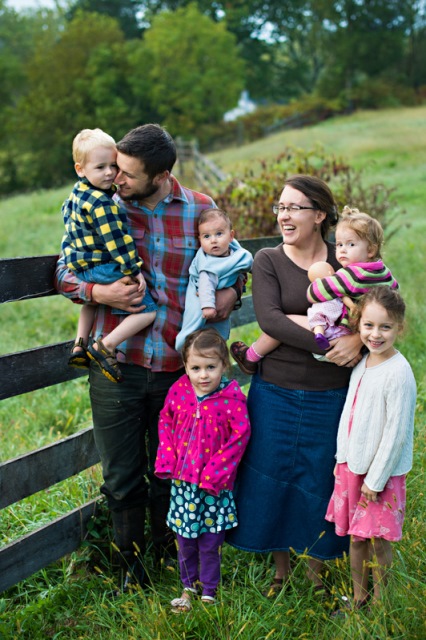
And also, my mom and dad help out a bunch. They clean eggs every Monday and Friday (for which the kids love to be around!), in addition to jumping in here and there as needed! I love having my parents’ help – for their help and for that time and relationship. In addition, I love it for Liz and the kids. We have a lot of nice time together. Of course, exactly how my family is involved in the farm will change as our family changes. But essentially, it is my goal to be the kind of dad, husband, son, and farmer that gives the best shot at wooing my kids and family to work with me (and eventually, when the tables are turned, and I am older, that I would be invited to help them in their work).
Q: What else would you like our readers to know about you and your farm?
A: I love my work and I am so grateful to all of our wonderful customers and friends who enable me to do this!

Jessica Claire Haney is the founder, publisher and editor of Mindful Healthy Life. She is a writer and editor and a co-leader for the Arlington/Alexandria chapter of Holistic Moms Network. Her personal blog is Crunchy-Chewy Mama and her writer’s site is JessicaClaireHaney.com. See the Contributors page and Jessica’s Mindful Healthy Life Q&A for more on Jessica.
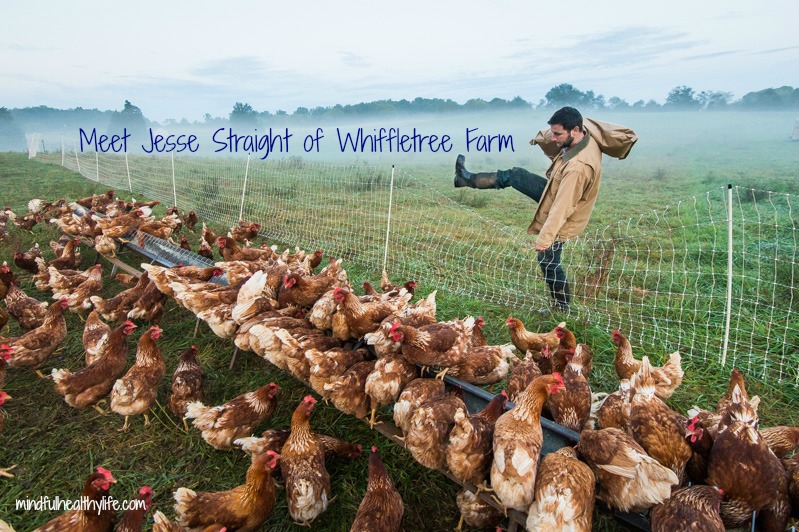
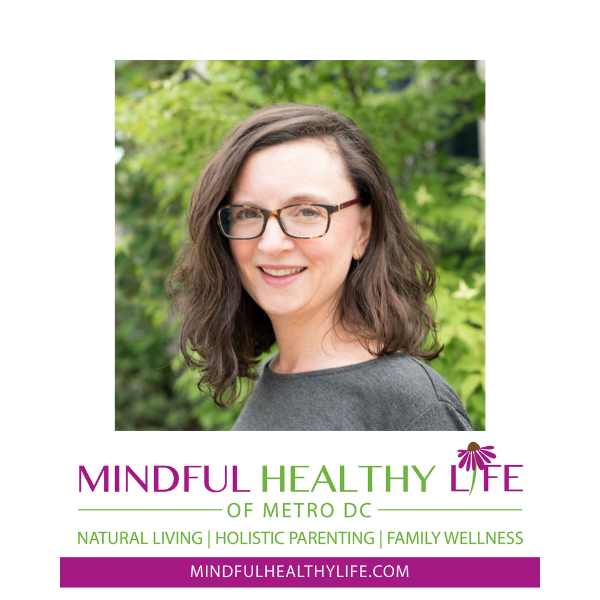
Beautiful story…best turkey I’ve ever had two years in a row..great products and very friendly and accommodating service to his customers.
Cherie Calvert
Board member
Weston A.Price foundation
What a great interview! I look forward to visiting Wiffletree one day with my children :)
What a great article! I learned a lot about farming AND this neat family!